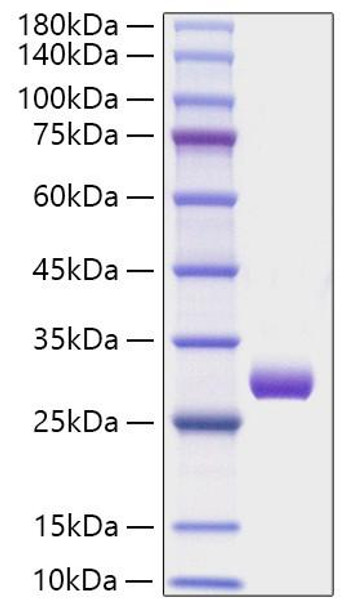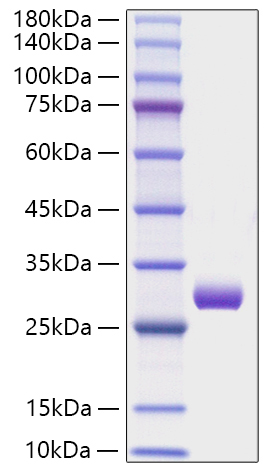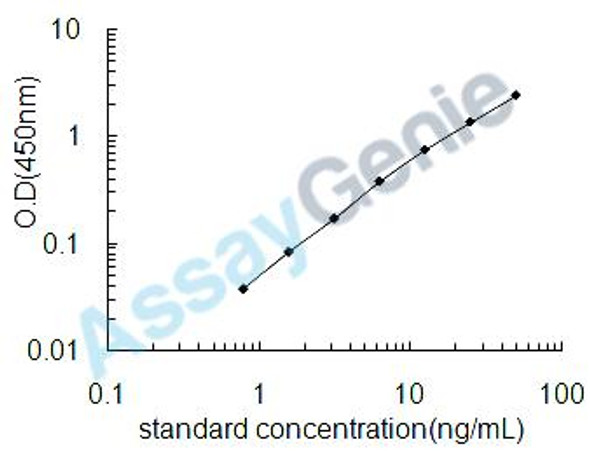Description
Recombinant Human Triosephosphate isomerase/TPI1 Protein
The Recombinant Human Triosephosphate isomerase/TPI1 Protein is a biologically active recombinant protein that plays a significant role in various cellular processes and signaling pathways in human biology. This protein is widely employed in immunological research, cell biology studies, protein-protein interaction analyses, and therapeutic development, providing researchers with a reliable tool for investigating Triosephosphate isomerase/TPI1 function and its implications in health and disease.
This product (SKU: RPCB1781) is produced using E. coli and features a N-His tag for convenient detection and purification. The protein exhibits a calculated molecular weight of 28.8 kDa with an observed molecular weight of 30 kDa under denaturing conditions, achieving ≥ 95 % as determined by SDS-PAGE., ensuring exceptional quality and consistency for research applications.
Key Features
| High Purity by Affinity Chromatography | |
| Mammalian & Bacterial Expression Systems | |
| High lot-to-lot consistency via strict QC |
| Product Name: | Recombinant Human Triosephosphate isomerase/TPI1 Protein |
| SKU: | RPCB1781 |
| Size: | 10 μg , 50 μg |
| Reactivity: | Human |
| Synonyms: | Triosephosphate Isomerase, TIM, Triose-Phosphate Isomerase, TPI1, TPI |
| Tag: | N-His |
| Expression Host: | E. coli |
| Calculated MW: | 28.8 kDa |
| Observed MW: | 30 kDa |
| Gene ID: | 7167 |
| Protein Description: | High quality, high purity and low endotoxin recombinant Recombinant Human Triosephosphate isomerase/TPI1 Protein (RP02792LQ), tested reactivity in E. coli and has been validated in SDS-PAGE.100% guaranteed. |
| Endotoxin: | < 1 EU/μg of the protein by LAL method. |
| Purity: | ≥ 95 % as determined by SDS-PAGE. |
| Formulation: | Supplied as a 0.22 μm filtered solution in 20mM Tris-HCl, 1mM DTT, 10% Glycerol, pH 8.0. |
| Storage: | Store at -70℃. This product is stable at ≤ -70℃ for up to 1 year from the date of receipt. For optimal storage, aliquot into smaller quantities after centrifugation and store at recommended temperature. Avoid repeated freeze-thaw cycles. |
Triose-phosphate isomerase, also named Triose-phosphate isomerase, TPI and TIM, is an enzyme that catalyzes the reversible interconversion of the triose phosphate isomers dihydroxyacetone phosphate and D-glyceraldehyde 3-phosphate. TPI has been found in nearly every organism searched for the enzyme, including animals such as mammals and insects as well as in fungi, plants, and bacteria. However, some bacteria that do not perform glycolysis, like ureaplasmas, lack TPI. TPI plays an important role in glycolysis and is essential for efficient energy production. TPI deficiency is an autosomal recessive disorder and the most severe clinical disorder of glycolysis. Triose phosphate isomerase deficiency is associated with neonatal jaundice, chronic hemolytic anemia, progressive neuromuscular dysfunction, cardiomyopathy and increased susceptibility to infection and characterized by chronic hemolytic anemia.







